THEATRE PRODUCTION
Time Without Books/ Waktu Tanpa Buku (Theatre Film)
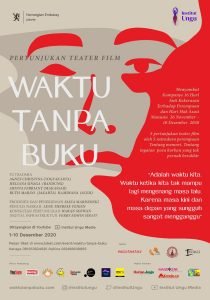
Written by Lene Therese Tiegen
Produced and translated by Faiza Mardzoeki
“In the January 11th 2021 English language edition of Tempo in an article titled: The (Literary) Arts In The New Reality by Nurdin Kalim, it states: “After a lengthy discussion, we decided that Waktu Tanpa Buku [Time Without Books] was Tempo’s choice for theatre performance art and chose Faiza Mardzoeki and her five directors as Tempo’s Artists of 2020 in the performance category. We feel that Faiza played the role of choosing those five directors and producing their online performances. It is rare to have work interpreted by five directors at the same time as part of a single project.“
The online theatre film screenings produced by Faiza Mardzoeki entitled ‘WAKTU TANPA BUKU’, abbreviated as WTB, are being directed by 5 female directors, namely Ramdiana from Aceh, Heliana Sinaga from Bandung, Ruth Marini from Jakarta, Shinta Febriany from Makassar and Agnes Christina from Yogyakarta.
The performances will be sensitive to both the needs of film and stage theatre. From the beginning, the directors have been aware that the production was for an online, streamed performance, later to be uploaded for ongoing watching. Both theatrical and cinematic aesthetics are being considered. Each director seeks new angles through discussions with their team, looks for references and has sought to look at things through the point of view of the camera. Directors have thought through the competing as well as complementary aesthetics. They are approaching creating the filmed production for its own aesthetics and not simply as documentation for archives.
The WTB film theatre is based on a drama script written by Lene Therese Teigen, a Norwegian
playwright. It tells a story about the memories of the victims of the past dictatorship in Uruguay. Lene wrote the manuscript based on research and interviews with exiles from Uruguay in Europe. The manuscript was translated into Indonesian by Faiza Mardzoeki. She thinks that the drama is very universal and very close to us here in Indonesia. The WTB drama unravels the personal memory of individuals that stem from the experience of the great turmoil of their nation’s politics. The characters created are very strong and can be a representation of anyone who may have experienced something similar.
This drama is also able to speak to those who have only heard whispers of what has happened, as well as to readers of the younger generation who are completely alienated from the history of their country. Through the Institut Ungu, she has invited female directors to work on the script as a statement that ‘Women’s rights are human rights’. The theatre film will be broadcast online between December 1-10 dedicated to welcoming Human Rights Day.
Silent Song Of The Genjer Flowers (Nyanyi Sunyi Kembang-Kembang Genjer)
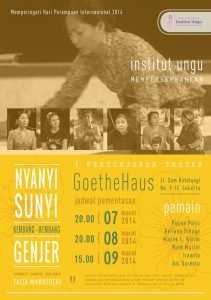
Producer, Writer and Director:
Faiza Mardzoeki
A story inspired by historical fact Dedicated to those Indonesian women who were “65” political prisoners and victims of sexual abuse in Indonesia and around the world.
This drama is inspired by historical fact and is based on two years research by Faiza Mardzoeki and her team. Faiza interviewed surviving victims in Jogjakarta, Solo, Klaten, Sragen, Semarang, Jakarta, Sweden and the Netherlands. She also visited Plantungan where “65” women politician prisoners were detained for years without trial. She and her team studied the available literature and Faiza read primary source materials available in various libraries, including in the Netherlands. There have been many discussions with historians who work on this period also.
Writing a drama about the ‘65’ women prisoners faced a special challenge. Faiza and her team are from the 70s generation, born and educated under the New Order and its decades of frightening black propaganda against these women prisoners. What their research revealed was the opposite of what they had been presented with through the school curriculum.
Auditions and then rehearsals began in October, 2013 after a yearlong process of writing, readings and editing and re-editing. The play was finally written by January, 2014. The challenge has not just been aesthetic and artistic, but for all of us involved in this project to properly understand and grasp the significance of this dark part of our nation’s history.
It has been our conversations with these now elderly surviving victims that havemade it possible for us to travel back and enter into a past from a time before we were born. The experiences of these women became like books that we needed to open and read well while remembering the other books and voices that we were confronted with directly during the New Order.
Silent Song Of The Genjer Flowers tells of the spiritual and mental struggles of five women, in their 70s and 80s, who were all political prisoners for more than ten years after 1965. They face daily survival in their old age while grappling with their memories of the joy and pride of their youth. While bearing also the trauma and memory of the bitter experiences of imprisonment and sexual violence, they face the stigma that those in power attached to them and all their friends.
The fate of these women confronts the consciousness of one young woman – a granddaughter of one of these five women. She must confront this reality both as a member of the suffering family as well as a citizen of the country where all this has taken place.
This is a part of Indonesian history which has helped form the current generation – that is: all of us today. This performance is dedicated to giving voice to these women and rejecting forgetfulness as to what they have experienced. They were and are citizen of our country, just like any other. They all have even contributed to the foundation of the Indonesian nation and for the progress of women in Indonesia. Yet they have suffered imprisonment without trial, sexual violence in prison, and have been libeled by sexual accusation. They bear a stigma until today.
Six experienced actors play these roles: Niniek L Karim, Pipien Putri, Irawita, Ani Surestu (Jakarta) and Ruth Marini (Lampung), and Heliana Sinaga (Bandung). The music for the play has been composed by Marcello Pellitteri, a New York based musician, who is also musical director. Pellitteri worked with Institut Ungu on the music for its 2011 adaptation of Ibsen’s A Doll’s House. Iskandar Loedin is stage and lighting designer. Mogan Pasaribu is sound director. Amerta Kusuma is videographer; Irina Dayasih is in charge of costumes and Atta is make-up artist. Furthermore, Ayez Kassar is assistant director and Wawan Sofwan is acting coach.
Silent Song Of The Genjer Flowers is being supported by Hivos and Elemental Productions (Los Angles) and personal donations. The project has also been supported by Elsam, Perempuan Mahardhika, Indonesia untuk Kemanusiaan and Bites. The Silent Song Of The Genjer Flowers team expresses its gratitude to Goethe Institute for its provision of a theatre venue and to all those who are supporting this project.
Subversif!
 Theatre Performance
Theatre Performance
In Bahasa Indonesia with English Subtitles
A play by Faiza Mardzoeki
Adapted from the classic drama ‘Enemy Of The People’ by Henrik Ibsen
Producer Faiza Mardzoeki – Director Wawan Sofwan
Date & Venue
March 13-14, 2015, Start 8pm
Graha Bhakti Budaya -Taman Ismail Marzuki Jakarta
CASTS
Teuku Rifnu Wikana, Ayez Kassar, Sita Nursanti, Dinda Kanya Dewi, Kartika Jahja, Hendra Yan, Madin Tasyawan, Andi Bersama, Wawan Sofwan
CREATIVE TEAM
STAGE AND LIGHTING DESIGNER: Iskandar Loedin- COMPOSER: Marcello Pellitteri – SOUND DESIGNER: Mogan Pasaribu – COSTUME DESIGNER: Hendra Yan – MAKE UP: Abul Sajallah – MULTIMEDIA: Lintang Samboja- VIDEO DOCUMENTATION: Amerta Kusuma – PHOTOGRAPHER Adrian Mulya- GRAPHIC DESIGNER: Gery Paul Andika, ASSISTANT DIRECTOR AND STAGE MANAGER: Heliana Sinaga-PRODUCTION MANAGER Vivi WidyawatI
Rumah Boneka

About Translation and Adaptation
“A Doll’s House” was translated and published in Indonesian language in the 1960s using very formal language; it was a “pure” translation. There has been no new translation or adaptation since then, until now.
I first read A DOLL’S HOUSE on 2008 after I heard comments that it was a play that contained many feminist features. I was interested then already in works of art that were engaged with issues regarding the situation of women in society.
I bought a copy of the 1960 translation published by Yayasan Obor. I compared it two English language versions: by Peter Watts (1960, Penguin) and Kenneth McLeish (1995, Cambridge University Press, reprinted 15 times 1995- 2009).
One aspect I noticed was how important Ibsen’s portrayal of the way Helmer talked to his wife, Nora, calling her: – from Peter Watts translation – : my little featherbrain, little scatterbrain, the squirrel, little prodigal, little birds, skylark, a baby, my little obstinate, little frightened dove and poor helpless little creature. These were often translated literally in the 1960 Indonesian translation.
Ibsen had a very critical consciousness regarding the husband wife relationship in society at that time.
When translated into Indonesian this way, the criticism intended by Ibsen is lost in Indonesian. These are not metaphors used in Indonesia.
This particular example among many, but an important example, aroused my interest in creating an Indonesian text of A DOLL’S HOUSE that would speak to the contemporary Indonesian. Such a contemporary language must seek to retain the criticalness and sharpness of Ibsen’s original in relation to the husband wife relationship. I have sought to use new metaphors, informed too I hope by a feminist perspective, that speak to the contemporary Indonesian situation.
I have tried also to think freely about how to adapt the story to contemporary Indonesia.
This version is a new Indonesian translation adapted to speak to the contemporary Indonesian society. It is set among the Jakarta middle class. This context is different, but the story still takes place just before Christmas. The characters now have Indonesian names and some scenes and dialogues – even the concretization of some conflicts – have been changed to fit the new context, influenced also perhaps by new perspectives and analysis.
In Ibsen’s original version there is a scene where the character Nora dances the Italian dance the “Tarantella”, an important scene in her process from the old to the new “Nora”. The Tarantella is unknown in Indonesia whereas the Jakarta middle class is already familiar with Ballet. From “Swan Lake” I take the metaphor of the “White Swan”, beautiful, sweet, gentle and loyal in contrast with the angry and vengeful “Black Swan”. Nora, often called “my White Swan” by her husband, (Tommy Herlambang), no longer wants to play the role of the White Swan for her husband. She becomes, perhaps, a black swan, seeking to dance her own dance, as she wishes.
There are many other contextualization that take place throughout the manuscript that place the characters and story in today’s Jakarta, in today’s Indonesia.
Theatre Production “RUMAH BONEKA”
This project was initiated by Faiza Mardzoeki, who is also the producer. Ms Faiza has translated Ibsen’s work and also adapted it to the Indonesian context, in particular contemporary Jakarta. I
Ibsen’s story in his play “A Doll’s House” is very relevant to Indonesian society. In this adaptation, the story revolves around the experiences of a Jakarta middle class family. A husband and wife are confronted with the challenge of questioning the values in the marriage and family life. “A Doll’s House” also challenges us to re-think questions of morality, religion and society in a society full of mental corruption and hypocrisy.
Faiza Mardzoeki’s adaptation of Ibsen’s “A Doll’s House” will be performed in the Gedung Kesenian Jakarta between 30 November and 4 December, 2011.
This is a production of Institut Ungu together with Pentas Indonesia, with the support of the Norwegian Embassy, the Gedung Kesenian Jakarta and Gathaya Performing Arts.
The lead role of Nora in a “A Doll’s House” will be played by Maya Hasan (a film and theatre actress and Indonesia’s leading harpist). Other players are Ayu Diah Pasha (a television, film and theatre actress), Ayez Kassar (a graduate of the Jakarta Institute of Arts and a an actor with wide experience), Teuku Rifnu Wikana (a rising film actor), Willem Bevers (a theatre and film actor, who played a lead role in Nyai Ontosoroh) and Pipien Putri.
The play is being directed by Wawan Sofwan, supported by artists from Jakarta, Bandung and New York. The approach of symbolic realism will be used, with especial attention given to the details of acting and dialogue. The stage design will use minimalist installation art allowing the audience to maximize focus on the actors and the development of the plot from incident to incident.
The music is being composed by Marcello Pellitteri, a New York based musician.
Another aspect of the international collaboration involved in this project were the visit to Norway by Faiza Mardzoeki and Wawan Sofwan between 28 May and 4 June 2011, at the invitation of the Norwegian Embassy, to visit Norwegian theatre centres as well as the Henrik Ibsen Studies Centre.
We are also holding a public seminar: “Ibsen: literature, society and women”. At the seminar we will also be launching the book version of Faiza Mardzoeki’s Indonesian adaptation of “A Doll’s House”. The seminar and launch will be attended by the foremost Norwegian actor, Juni Dahr as well as Professor Frode Helland from the Centre for Ibsen Studies, University of Oslo. The deputy foreign minister of Norway will also attend. Various Indonesian speakers will be present.
We will also be working with partners in Dili, Timor Leste to organize a seminar on “A Doll’s House” in that location as well. This seminar is also aimed at raising discussion about the role of women in society using “A Doll’s House” as a discussion starter. This will also be an important cultural exchange Indonesia, Timor Leste and Indonesia. It will be held in November, 2011.
A Monologue Theatre Performance “Women Seize The Night”
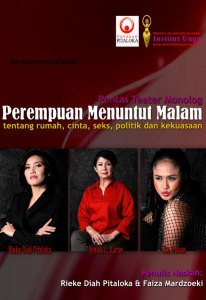 A Monologue Theatre Performance
A Monologue Theatre Performance
“Perempuan Menuntut Malam”
(Women Seize The Night)
Jakarta-Banda Aceh-Bandung
On the occasion of International Women’s Day March 2008
“Women Seize the Night”, comprised 4 manuscripts – with three being performed at each performance. Three were written by Faiza Mardzoeki and Rieke Diah Pitaloka. These were: “A Plate of Fried Rice”, “Under a street light”, and “A busy morning”. “The dance of the Empu” was written by Tati Krisnawaty.
These performances entitled “Women Seize the Night” was inspired by the “Reclaim The night” movement organized by activists in Rome in 1976. Around 10,000 women and children turned out on the streets to demand and end to sexual violence against women and children. This was a movement of “Breaking the silence of Men Sexual’s Violence”. This movement has now spread to many other countries.
In patriarchal societies, violence against women finds form in almost every corner of life. These plays have emerged from rejection of this.
A play: They Call Me Nyai Ontosoroh
Written and Produced by Faiza Mardzoeki
Directed by Wawan Sofwan
In 2007 in Indonesia, the country’s major daily newspaper, Kompas, declared the play Nyai Ontosoroh (The Concubine Named Ontosoroh) as the theatrical production of the year. The play had been performed by several theatre groups in several cities throughout the year. A specially selected ensemble, under the direction of Wawan Sofwan, performed it to packed houses in Jakarta. A thousand people came each night, with standing room only, even the stairs had people sitting there.
The play is by Indonesian playwright activist Faiza Mardzoeki’s adaptation of Pramoedya Ananta Toer’s record breaking Indonesian novel Bumi Manusia (This Earth of Mankind). Faiza’s adaptation focuses on the story of the concubine named Ontsoroh, who was sold as a young girl, the named Sanikem to become the concubine of a Dutch businessman in Surabaya, the second biggest city in the then Netherlands Indies. The play follows the struggles and tribulations of Sanikem alias Ontosoroh as she fights to overcome her status as a nyai (concubine); to defend the family she has in concubinage, and to raise up the dignity and worth of all “natives” in the Indies.
in 2010 she took her production of They Call Me Nyai Ontosoroh, to Amsterdam, The Hague, and Antwerp, commissioned by Troppen Theater, Amsterdam.
Nyai Ontosoroh
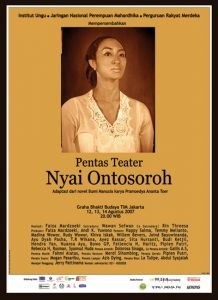
A Play by Faiza Mardzoeki
Producer Faiza mardzoeki
Director : Wawan Sofwan
In 2007 in Indonesia, the country’s major daily newspaper, Kompas, declared the play Nyai Ontosoroh (The Concubine Named Ontosoroh) as the theatrical production of the year. The play had been performed by several theatre groups in several cities throughout the year. A specially selected ensemble, under the direction of Wawan Sofwan, performed it to packed houses in Jakarta. A thousand people came each night, with standing room only, even the stairs had people sitting there.
The play is by Indonesian playwright activist Faiza Mardzoeki’s adaptation of Pramoedya Ananta Toer’s record breaking Indonesian novel Bumi Manusia (This Earth of Mankind). Faiza’s adaptation focuses on the story of the concubine named Ontsoroh, who was sold as a young girl, the named Sanikem to become the concubine of a Dutch businessman in Surabaya, the second biggest city in the then Netherlands Indies. The play follows the struggles and tribulations of Sanikem alias Ontosoroh as she fights to overcome her status as a nyai (concubine); to defend the family she has in concubinage, and to raise up the dignity and worth of all “natives” in the Indies.
A Play Women At Point Zero
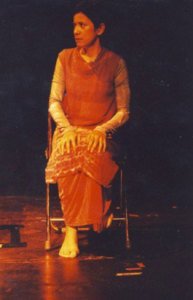 The production of “Women at Point Zero” in 2002 was a different experience. I proposed the idea that the well-known novel of the Egyptian feminist, Nawal El Saadawi, be produced as theatre in 2001. There were a number of different reactions. While I had spent some time with theatre groups in the early 1990s, I was proposing this ideas an activist in the organisation WOMEN’S SOLIDARITY. So some reacted: Faiza, you are an activist, and what are you doing talking about producing a play. Perhaps you really want to make some kind of street demonstration – is that it?
The production of “Women at Point Zero” in 2002 was a different experience. I proposed the idea that the well-known novel of the Egyptian feminist, Nawal El Saadawi, be produced as theatre in 2001. There were a number of different reactions. While I had spent some time with theatre groups in the early 1990s, I was proposing this ideas an activist in the organisation WOMEN’S SOLIDARITY. So some reacted: Faiza, you are an activist, and what are you doing talking about producing a play. Perhaps you really want to make some kind of street demonstration – is that it?


